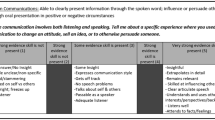Abstract
One of the most influential roles clinical psychologists play in health care settings is as consultant to medical colleagues. The psychologist consultant typically approaches either clinical or programmatic questions intending to tap both empirical research and clinical judgment perspectives in trying to answer them. This paper describes a specific “program consultation case,” a not atypical consultation situation in which graduate medical education directors asked for advice about their residency training program. The purpose is to use this example to generate ideas and provoke discussion about such consultation processes and their usefulness in the health care training and service delivery world. The psychologist may be faced with questions that have meaningful implications beyond the specific consultation. What if the concerns being posed by this particular program are concerns which have been raised before, have been researched before, and have generated reasonable suggestions, conclusions, and strategies for improvement? And what if no one has paid attention, so that the questions are being raised again? When empirical and clinical data consistently combine to identify problems within health-related training or service delivery systems, and when suggestions or alternatives for their solutions have been presented and, also presumably, ignored, what does the clinical psychologist consultant do next?
Similar content being viewed by others
References
Alexander, D. A., Monk, J. S., & Jonas, A. P. (1985). Occupational stress, personal, strain, and coping among residents and faculty members.Journal of Medical Education, 60(4), 830–839.
Archer, L. R., Keever, R. R., Gordon, R. A., & Archer, R. P. (1991). The relationship between residents' characteristics, their stress experiences, and their psychosocial adjustment at one medical school.Academic Medicine, 66(5), 301–303.
Badger, L. W., Chesebro, M. J., & Hartman, J. A. (1987). First year residency stress: Sources and mediators.Family Practice Research Journal, 7(2), 104–113.
Bertram, D. A., Hershey, C. O., Opila, D. A., & Quirin, O. (1990). A measure of physician mental work load in internal medicine ambulatory care clinics.Medical Care, 28(5), 458–467.
Butterfield, P. S. (1988). The stress of residency: A review of the literature.Archives of Internal Medicine, 148, 1428–1435.
Cohen, M. I., Dancis, J., Finberg, L., Hirschhorn, K., Katz, M., & Wasserman, E. (1989). Patient care, resident stress, and government regulation.AJDC, 143, 181–182.
Coombs, R. H., Perell, K., & Ruckh, M. J. (1990). Primary prevention of emotional impairment among medical trainees.Academic Medicine, 65(9), 576–581.
Evans, C. L., Tamburrino, M. B., Franco, K. N., & Seidman, P. A. (1986). Is internship really the worst?Journal of Psychiatric Education, 10(2), 113–119.
Firth, J., & Morrison, L. (1986). What stresses health professionals? A coding system for their answers.British Journal of Clinical Psychology, 25(4), 309–310.
Firth-Cozens, J., & Morrison, L. A. (1989). Sources of stress and ways of coping in junior house staff.Stress Medicine, 5(2), 121–126.
Hoekelman, R. A. (1989). Stress experienced during pediatric residency training.AJDC, 143, 177–180.
Jex, S. M., Hughes, P., Storr, C., & Conrad, S. (1992). Relations among stressors, strains, and substance use among resident physicians.International Journal of the Addictions, 27(8), 979–994.
Kirsling, R. A., Kochar, M. S., & Chan, C. H. (1989). An evaluation of mood states among first-year residents.Psychological Reports, 65(2), 355–366.
Kumari, K., & Sharma, S. (1990). Social support, organizational role stress and well-being: A study of medicos.Psychological Studies, 35(3), 163–169.
Lee, C. (1987). Professionals in medical settings: The research evidence in the 1980s.Journal of Organizational Behavior, 8(2), 195–213.
Lemkau, J. P., Purdy, R. R., Rafferty, J. P., & Rudisill, J. R. (1988). Correlates of burnout among faculty practice residents.Journal of Medical Education, 63(9), 682–691.
Revicki, D. A., & May, H. J. (1983). Development and validation of the Physician Stress Inventory.Family Practice Research Journal, 2(4), 211–225.
Revicki, D. A., May, H. J., & Whitley, T. W. (1991). Reliability and validity of the Work-Related Strain Inventory among health professionals.Behavioral Medicine, 17(3), 111–120.
Revicki, D. A., Whitley, T. W., Gallery, M. E., & Allison, E. J. (1993). Impact of work environment characteristics on work-related stress and depression in emergency medicine residents: A longitudinal study.Journal of Community and Applied Social Psychology, 3(4), 273–284.
Schwartz, A. J., Black, E. R., Goldstein, M. G., Jozefowicz, R. F., & Emmings, F. G. (1987). Levels and causes of stress among residents.Journal of Medical Education, 62(9), 744–753.
Simpson, L. A., & Grant, L. (1991). Sources and magnitude of job stress among physicians.Journal of Behavioral Medicine, 14(1), 27–42.
Taylor, A. D., Sinclair, A., & Wall, E. M. (1987). Sources of stress in postgraduate medical training.Journal of Medical Education, 62(5), 425–428.
Toews, J. A., Lockyer, J. M., Dobson, D. J., & Brownell, A. K. (1993). Stress among residents, medical students, and graduate science (M.Sc./Ph.D.) students.Academic Medicine, 68(10, Suppl.), S46-S48.
Urbach, J. R., Levenson, J. L., & Harrison, J. W. (1989). Perceptions of housestaff stress and dysfunction within the academic medical center.Psychiatric Quarterly, 60(4), 283–296.
Wolfgang, A. P. (1988a). The Health Professions Stress Inventory.Psychological Reports, 62(1), 220–222.
Wolfgang, A. P. (1988b). Job stress in the health professions: A study of physicians, nurses, and pharmacists.Behavioral Medicine, 14(1), 43–47.
Author information
Authors and Affiliations
Rights and permissions
About this article
Cite this article
Sheridan, K. The clinical psychologist as program consultant: When is enough enough?. J Clin Psychol Med Settings 2, 289–298 (1995). https://doi.org/10.1007/BF01990883
Issue Date:
DOI: https://doi.org/10.1007/BF01990883




